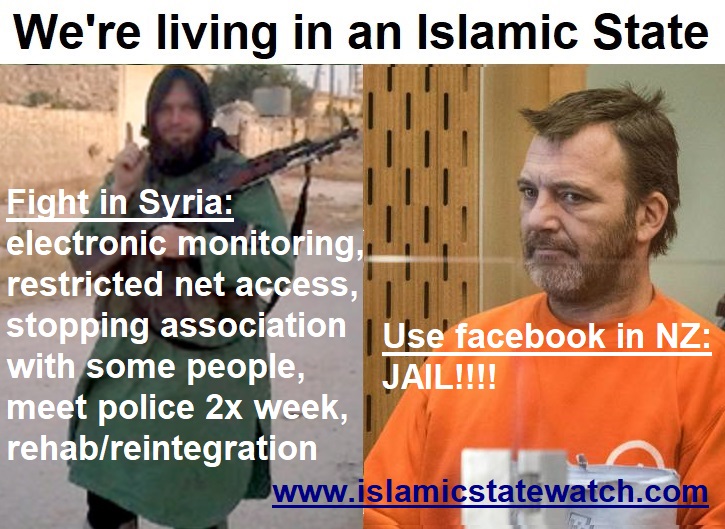New Zealand is voted the most Islamic country in the world because we incarcerate those who speak out against Islam, while an actual returning terrorist receives temporary restrictions that are mildly inconvenient to normal daily life. The same Islamic countries that enable and sponsor Islamic State also openly sponsor mosques here in NZ.
It should be noted however, that it is only Islamic academic institutions and the imams that graduate from them that are able to twist the quran and histories of the prophet to create any sort of coherent religion out of it. There has never been a time in history where more Muslims are learning to read and then reading the writing of the prophet, the saying of the prophet and the life of the prophet themselves, and are leaving Islam. These books do not say what their imams claim they do. We encourage everyone reading this site to download those three works and read them for yourselves to see how local imams twist them to claim their prophet was sent from God. An education can easily defeat this terrorist ideology.
While many local muslims rejoice that this returning terrorist receives temporary restrictions, there are some here in NZ who, although they’ve left Islam, keep the charade for fear for their lives because of the ever present threat of honour killings, as sanctioned by the writing above. One of the worst honour killings was of a mother and daughter in Ranui after they met with an Anglican vicars wife. The only people who can stop the violence are the imams, many of which are still preaching that the Quran is the word of God and Mohammad is the perfect man, and if your wife is mouthy, you should follow the Quran’s instructions and strike her.

A person associated with the Islamic State who is coming to New Zealand has been issued an “interim control order” under the Terrorism Suppression Act – the first order of its kind in this country.
In a High Court judgment on May 7, Justice Rebecca Ellis said the person, named R and who has name suppression, was associated with the Islamic State in Iraq and the Levant (Isil) – also known as Isis – which was a “designated terrorist entity”.
R was currently detained overseas, was not entitled to remain there nor enter any other country.
“Repatriation to New Zealand is therefore inevitable,” Ellis said.
Subsequently, the Police Commissioner had sought an interim control order under the Terrorism Suppression (Control Orders) Act 2019, which would place a range of restrictions on the person, from travel ability to social media access.
Such orders were required to “protect the public from terrorism; to prevent engagement in terrorism-related activities in a country; and to support the relevant person’s reintegration into New Zealand or rehabilitation, or both”.
In her judgment, Ellis said the person had their passport and/or citizenship revoked “for reasons including a security risk related to engaging in terrorism-related activities in a foreign country”.
Evidence filed had established an order was necessary “in order to manage the real risk of R engaging in terrorism-related activities in New Zealand”.
“People in similar circumstances to those of R pose a continuing risk of terrorism-related activities to countries to which they are repatriated.
“Some are encouraged to return to Western countries to facilitate Isil’s agenda, which may, in extreme cases, include carrying out terrorist attacks, but more commonly involves providing financial support for Isil (by earning money in the West and sending it back to Isil members) and to promote the ideology of Isil in an attempt to persuade others in the West to support it.
“In R’s case, the principal risk is assessed as being that they will provide financial support to Isil and promote its agenda to others.”
However, there was “nothing before me to suggest a risk that R would themselves engage in acts of terror or violence”, Ellis said.
“Rather, the evidence suggests that R poses a real risk of engaging in activities that facilitate or materially support the carrying out of terrorism.
“There is also a significant public interest in assisting R to reintegrate into New Zealand and to assist in their rehabilitation.”
Ellis granted an interim control order for 12 months, to begin once R entered New Zealand.
They would not be able to leave New Zealand, possess any passport or other travel documents, and their internet and financial activities would be closely monitored by police, among other restrictions.
R did not oppose the interim control order, but also did not consent to it.
R’s lawyer Deborah Manning said R did not accept that they posed a risk under the Terrorism Suppression Act.
“They acknowledge, however, that the New Zealand authorities need time to make their own assessment of that, following their arrival here,” the judgment said.
–Person coming to NZ associated with Islamic State issued terrorism control order


